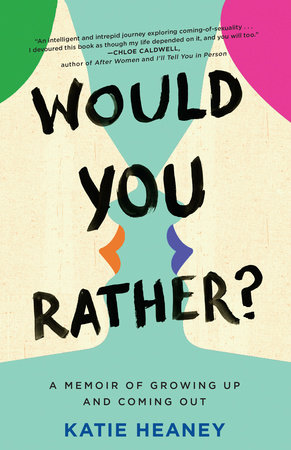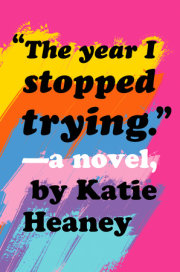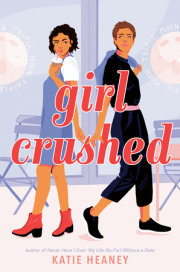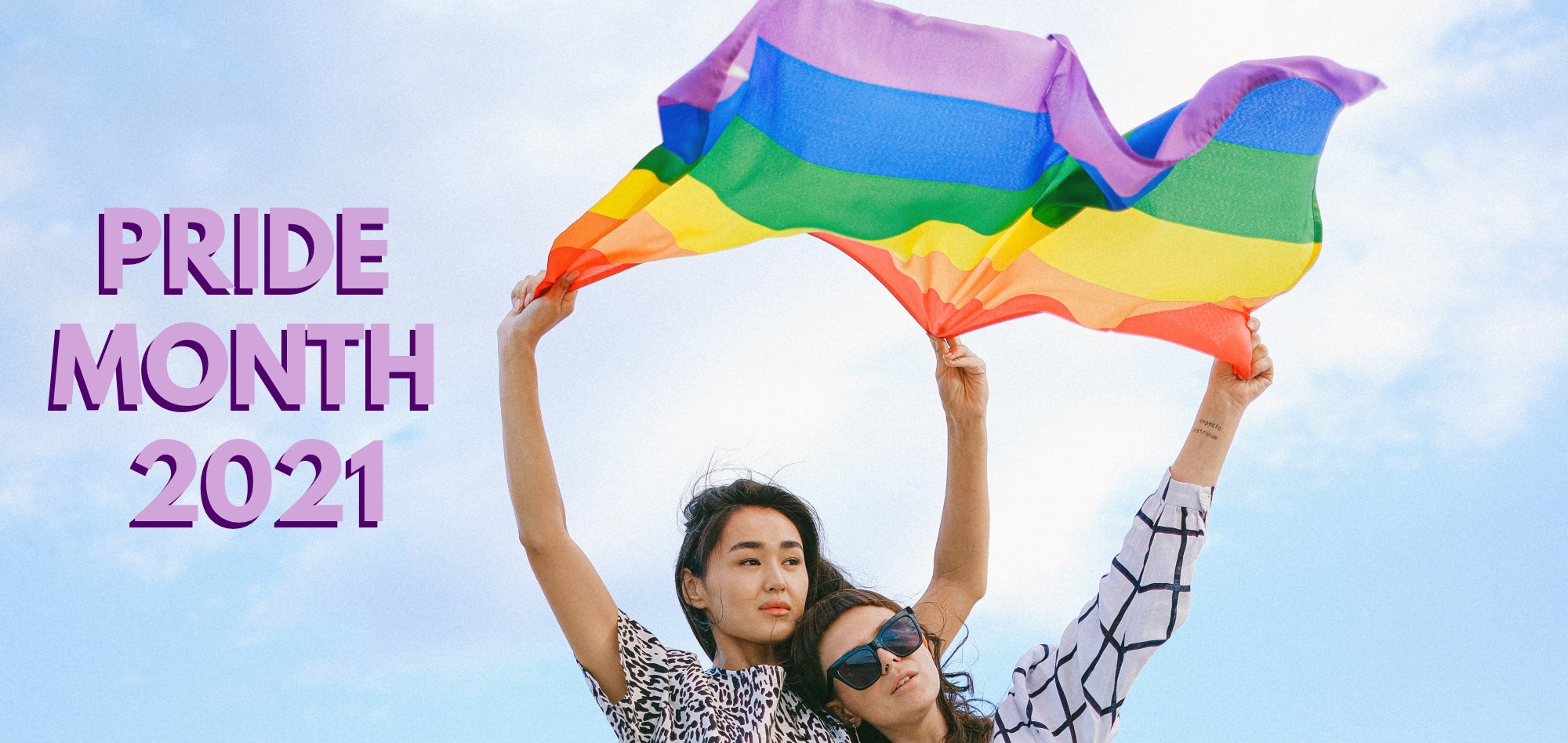Chapter 1
The L Word
The first time it occurred to me that I could be anything less than 100 percent straight, I was twenty-one. I was also in Spain, halfway into a semester abroad in Madrid, and I was not having a very good time.
There were one hundred students in my program. Most were American, from the East Coast, though there was also a not-insignificant contingent from Cuba and the Dominican Republic. On the flight over I’d entertained the vague possibility that I might finally find a boyfriend among the students I’d meet, and have one of those whirlwind study-abroad romances my friends kept having. Then I got there, and looked around the auditorium where we first gathered, and counted exactly seven men. Total. Two of whom, I later learned, were gay. Well, at least two. A third was considered a very likely suspect, but nobody knew for sure. And then, within three days of touching down on foreign soil, the cutest of the five (or four) straight guys there found the girl who looked most like a sorority president, and she dumped her boyfriend back home, and the two of them commenced their whirlwind study-abroad romance, whose tumultuous nature would provide a kind of comforting Real World–esque entertainment for the rest of us. Seeing as the demographics really allowed for only one heterosexual high-drama study-abroad relationship, I immediately admitted defeat, and settled instead on finding lifelong best friends.
That mission didn’t go much better. The closest I came was a trio of Penn State students who’d arrived in Madrid as a fully formed clique. I could rope them into a night out or—my preference—a daytime historical-site visit once in a while. But they were wealthier than me, and much bigger partiers than I was (not hard to be), and kind of bitchy. And I say that with the utmost admiration. I love mean people. It feels so good when a mean person likes you. It’s like, I guess I am extremely cool. I basked in that glow for as long as they tolerated my mom-ish friend herding, which was maybe about a month.
My friendlessness coupled with my inability to afford travel outside the country, or eat out very much, meant I had a lot of time to myself. On weekend days I’d force myself into modest, repetitive adventure: I’d take a bus to Puerto del Sol to buy myself a cream Neapolitan at La Mallorquina and then window-shop and walk through Plaza Mayor. I’d make yet another trip to the Prado and visit my favorite paintings and write depressing journal entries. I have never been very good at open-ended exploring, and back then I was even worse. If I must do it I need at least one fixed destination, usually involving food, and once there, I can wander within a small, neat circumference of that spot. Before going anywhere alone I triple-check my routes, and usually I overestimate how long it will take me to get there. It isn’t quite getting lost that I fear so much as it is the associated embarrassment—looking lost, or looking somehow out of place. Looking alone.
My guilt wouldn’t allow me to wallow in my host’s apartment all day every weekend, but it did not mind if I did so most weeknights after school. In the afternoons, at the end of my half-hour, humid, and mostly uphill walk home from the university, I would stop at the shop across the street to buy a Diet Coke and a little bag full of gummy candy, and then I’d head upstairs for the night. There I’d eat the late lunch my generous if curmudgeonly señora made daily for my roommate and me, though because my roommate had a life, I often ate for us both. And then, with three or four hours left before I could reasonably go to bed, I would watch TV.
There was no Netflix streaming at that time, so I illegally and painstakingly downloaded everything I watched one episode at a time. There was also no WiFi, so in order to do this I had to plug my laptop into the modem by an ethernet cord I stretched across the tiny living room to the dining-room table, where I sat to watch shows until my señora came home. She’d walk in around 6:00 each evening and, finding me sitting there, say, “Ya estás.” You’re still here. Sometimes I’d wait a while before my retreat, and we’d watch TV separately, together—me at the table watching on my laptop with headphones on, eating gummies, her on the couch watching talk shows on her 32-inch screen, eating a bowl of potato chips. Sometimes I’d head right for my room, my loneliness making that kind of extended, quiet indifference to each other feel intolerable. If I opened each episode of a show in its own tab and it finished downloading all the way before I disconnected, I could watch it atop the scratchy IKEA comforter in my room. If it didn’t finish, or an episode froze up five minutes in—which happened a lot—I was devastated. Then I’d have to read or, worse, write more depressing journal entries.
First I worked my way through The Office, starting again from the beginning. Then I re-watched the better seasons of Sex and the City (two through four). Then I felt like watching something I hadn’t already seen—ideally something with more than four seasons, so I knew it might last me a significant portion of my remaining time in Madrid. (Nothing soothes me like a long-term goal.) And, with no social life of my own to speak of, I knew I wanted something with lots of relationships and friendships and drama. Beyond these criteria I don’t remember exactly how it was that I arrived at The L Word. All I know is that as soon as I started the pilot, I was hooked.
That’s not to say the show was very good, which it often wasn’t. The music (to say nothing of the theme song) was melodramatic, as was the plot. The characters’ behavior was frequently reprehensible, and their clothing, insane. But almost all of those reprehensible characters were women, and the less reprehensible ones (for nobody on that show is truly innocent) were, too. My screen was full of women. Their omnipresence was striking. I couldn’t believe that a show like this had ever aired. For multiple seasons. And yes, it was premium cable, and yes, everyone on it was skinny and beautiful and almost everyone was femme and white, and yes, it was so, so far from perfect. But it was also so, so different from everything I was used to.
I was (and am) used to watching shows and movies dominated by men and, secondarily, the women they sleep with. It’s been more than ten years since the first episode of The L Word aired, and—aside from the rare exception, like Orange Is the New Black—that hasn’t really changed. Women are one another’s friends, sometimes, but mostly they are men’s girlfriends and wives. In The L Word, every role was played by a woman: temptress café owner, millionaire philanthropist, sexy carpenter, failing novelist, famous athlete, closeted cougar wife, sex worker cum hairstylist, DJ. This world, in its forceful femaleness, was something that greatly appealed to me. I did not feel a part of it, but I found myself longing to be. Mostly, I thought, this was because I missed my own world of girls, carrying on our life together without me, back at school in Illinois. But it kind of seemed like there was something else going on, too.
That thing was Shane.
If you haven’t seen the show, do yourself a favor and Google Image search “Shane McCutcheon” right now. I mean, look at her. Shane—played by Kate Moennig—is The L Word’s resident heartbreaker, an impossibly skinny, impossibly gorgeous jerk with disheveled hair the likes of which would suggest grave instability on anyone else’s head. She’s a womanizer, and a cheater, and possibly a moron, and yet she is so, so hot. There is her mouth—pouty lips always hanging open, the gravelly low voice that comes out of it. There are her fingers, bony and covered in silver jewelry. The first thing I distinctly remember her wearing was some sort of low-cut, lace-up leather halter crop top with leather pants slung so low you could see her pelvic bones. I was sort of like, what the fuck is that outfit, but I was also . . . intrigued.
Leather-halter-top incident aside, Shane was, by far, the most boyish lesbian of the bunch. I had never seen anyone like her. Back then, before I knew any better, I thought that the rest of the characters on the show could have just as easily passed for straight, but I didn’t see how anybody could look at Shane and, for even a second, think she’d be interested in sleeping with men. She was usually dressed in muscle tees that highlighted her flat chest and lean, muscular arms, or else T-shirts under oversized blazers. She wore boots or sneakers but never heels or flats. Early on, there were also a lot of bad belts and arm cuffs, but you have to forgive her for that, because it was the early aughts, and everyone was accessorizing like there was no tomorrow. Shane was tall, too, always lifting girls’ faces by the chin so she could kiss them. Often she had not yet spoken more than two words to these girls, but it didn’t matter how implausible it was because everyone was happy—Shane, the girl she was kissing, and me, watching, invested enough in this character’s sexcapades that I soon started to wonder if it “meant something.”
It soon became imperative for me to know if the actress who played Shane was gay in real life, too. It was in the process of this online investigation—Googling as many variations on the search terms “Kate Moennig gay” and “Kate Moennig girlfriend” and “Kate Moennig sexuality” as I could think up—that I learned exactly how clichéd my fascination was. I found Web forums dedicated to this topic alone, and I clicked through dozens of pages, inhaling every bit of trivia (or baseless speculation) I came across. There were a number of Yahoo Answers posts written by straight girls wondering if their attraction to Shane meant they weren’t so straight after all. (“Did Watching the L Word Make Me Bi?”) There were T-shirts for sale that read “I’d Go Gay for Shane” across the chest.
At first it was comforting to know I was far from the only one with a Shane fixation. The more I read, the easier it was to decide that Kate Moennig was simply one of those people whom everybody, no matter their orientation, is attracted to. Knowing that there were a bunch of other self-identified straight girls who were crushing on the same actress as I was didn’t strengthen my feelings; if anything, it diminished them. Having a crush on this woman in particular didn’t mean much about my sexuality, the same way that finding The Office funny doesn’t mean much about your sense of humor. It just meant I was a human being with an extremely popular opinion.
Still, I wrote a Facebook message to my best friend, Rylee, back home, under the auspices of catching her up on what I’d been doing (nothing) and how I’d been feeling (bad, sad). And, by the way, there’s this random TV show I’m newly obsessed with. I can’t remember exactly what I said, but I know it included something along the lines of “I think watching this show is making me turn into a lesbian.” And then I attached a picture of Shane.
I love to present my concerns and insecurities as half-jokey hyperbole so that nobody can tell I am actually very serious and terrified. It’s like I believe that if I make a joke about it, it can’t come true. It is the same thing I do when I am at the doctor and I attempt to ingratiate myself with the nurse by “joking” about the fact that I think I have a brain tumor because I get headaches a lot. Rylee knows this about me, so, understandably, she took this confession with a pretty massive grain of salt. In her reply, she did all the right things. She asked me questions, told me that, no matter who I was attracted to, I was fine and normal, and told me she loved me.
She also wrote that she agreed, Shane was extremely hot, and even she would probably have sex with her, or at least make out with her for a little bit.
So maybe that was all it was. In her message Rylee asked if I thought I was attracted to other women, and I wrote back that I didn’t know. She asked if I was still attracted to men, and I wrote that I was. But after I sent it I second-guessed myself. As a sort of unscientific experiment with myself, I walked around Madrid looking only at the women and none of the men. I stared at the prettiest ones, trying to deduce whether I looked because I was admiring someone pretty or because I was attracted. I felt that in the course of watching the show I had lost the ability to tell the difference. Maybe I had been so thoroughly exposed to women (by a single female-dominated TV show; as if!) as the only possible object of desire that I had suddenly lost the ability to feel otherwise—as if my previous heterosexuality had been, effectively, brainwashed out of me. Like, basically, what evangelical Christians argue can happen to youths exposed to LGBTQ culture had actually happened to me.
I knew this was ridiculous, and yet I could not let it go. With no one to talk to and nothing much I could bring myself to do, thinking was all that was left. In the best of times I am prone to overanalysis, but when I am lonely there is no limit to how far inward I can go. On the bus, in class, in my bed, waking up before my alarm went off, I tried to work through my sexuality like a mathematical theorem. If A = zero boyfriends thus far and B = number of times you rewound that Shane and Carmen sex scene, C = . . . maybe kinda gay. But then, if A = the dozens of real-life crushes on boys you’ve had and B = the zero real-life crushes on girls you’ve had, C = straight, probably. But then, but then.
One night, when I was about halfway into season four of The L Word, the episode froze. I tried downloading it from another site, but that one froze, too. So did the third. By then I was far enough into my trip that the end was in sight, and I think that’s why it wasn’t so hard to let go. That, and the fact that I’d worn myself out. The L Word wasn’t “making me” gay, but it had inspired an existential crisis I was no longer interested in experiencing. So, instead, I went about making the most of my remaining time in Spain, doing all the things I maybe should have been doing all along but could only rarely bring myself to do. I went to see Guernica and cried. I went to the southern coast with my cool mean pseudo-friends for a long weekend. I ate all the things that had comforted me over those four months, knowing that eventually I’d miss them, that eventually I’d forget just how sad I’d been walking through the city alone to buy them. And then, finally, I went home.
Copyright © 2018 by Katie Heaney. All rights reserved. No part of this excerpt may be reproduced or reprinted without permission in writing from the publisher.







